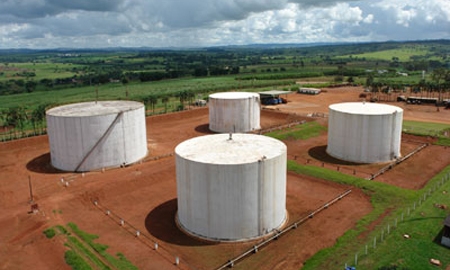Bioethanol is a form of renewable energy which can be produced from simple crops such as potatoes, corn and sugarcane – and Goiás is the second-largest producer of bioethanol from sugarcane on the planet. Of the 15 states producing sugarcane in Brazil, Goiás is the third largest after São Paulo and Minas Gerais, and in terms of bioethanol production alone the state is second only to São Paulo. The total area occupied by sugarcane in Brazil is less than nine million hectares at present, so with an area of over 35 million hectares, Goiás has ample space for growth.
André Luiz Baptista Lins Rocha is President of SIFAEG, the syndicate which brings together the ethanol producers of Goiás. He has confidence in the state’s ability to create a cleaner source of energy for the whole country: “By 2015, approximately 15% of the electricity generated in the country could come from biomass. One may say that agro-energy is truly the salvation of the crop.”
“By 2015, approximately 15% of the electricity generated in the country COULD come from biomass.” André Luiz Baptista Lins Rocha,
President of SIFAEG |
The American Government, according to the Environmental Protection Agency, considers ethanol as an advanced fuel. In its calculations the American agency concludes it emits 60% less CO2 than gasoline.
“The United States can participate in the sector here in Brazil and take back fuel that is cleaner, more efficient, that can improve the American electric power network, which is not very clean or renewable, and help to fulfill the Kyoto and Copenhagen protocols,” points out Rocha.
Anoth er advantage is the low cost of production. The current value for ethanol production is $0.22 per liter when the feedstock is sugar cane, but $0.30/l, when corn and $0.53/l when beet is used. The United States makes corn-based ethanol and Europe uses beet. Based on these values, one can say that the alcohol produced in Brazil is the most appropriate for the consumer.
The agro-energy and biofuel sectors in Goiás also represent smarter investment opportunities because of their sustainability. Agricultural areas are maintained with very few insecticides and no poisons – wasps are used to eradicate potentially harmful cricket populations, and cane residues are recycled to provide fertilizers. The by-products left from sugarcane also serve as compost, meaning that bioethanol production is truly a cleaner, more sustainable means of producing energy.
The climate, soil and topography all make Goiás a sensible prospect for investors, while incentive programs give the state a competitive advantage over other sugarcane producing regions.
British Petroleum has recently started investing in alternative sources of renewable energy, and has two plants operating in Goiás, in Itumbiara and Edeia. The energy company has plans to double its production capacity in the Itumbiara plant.

0 COMMENTS